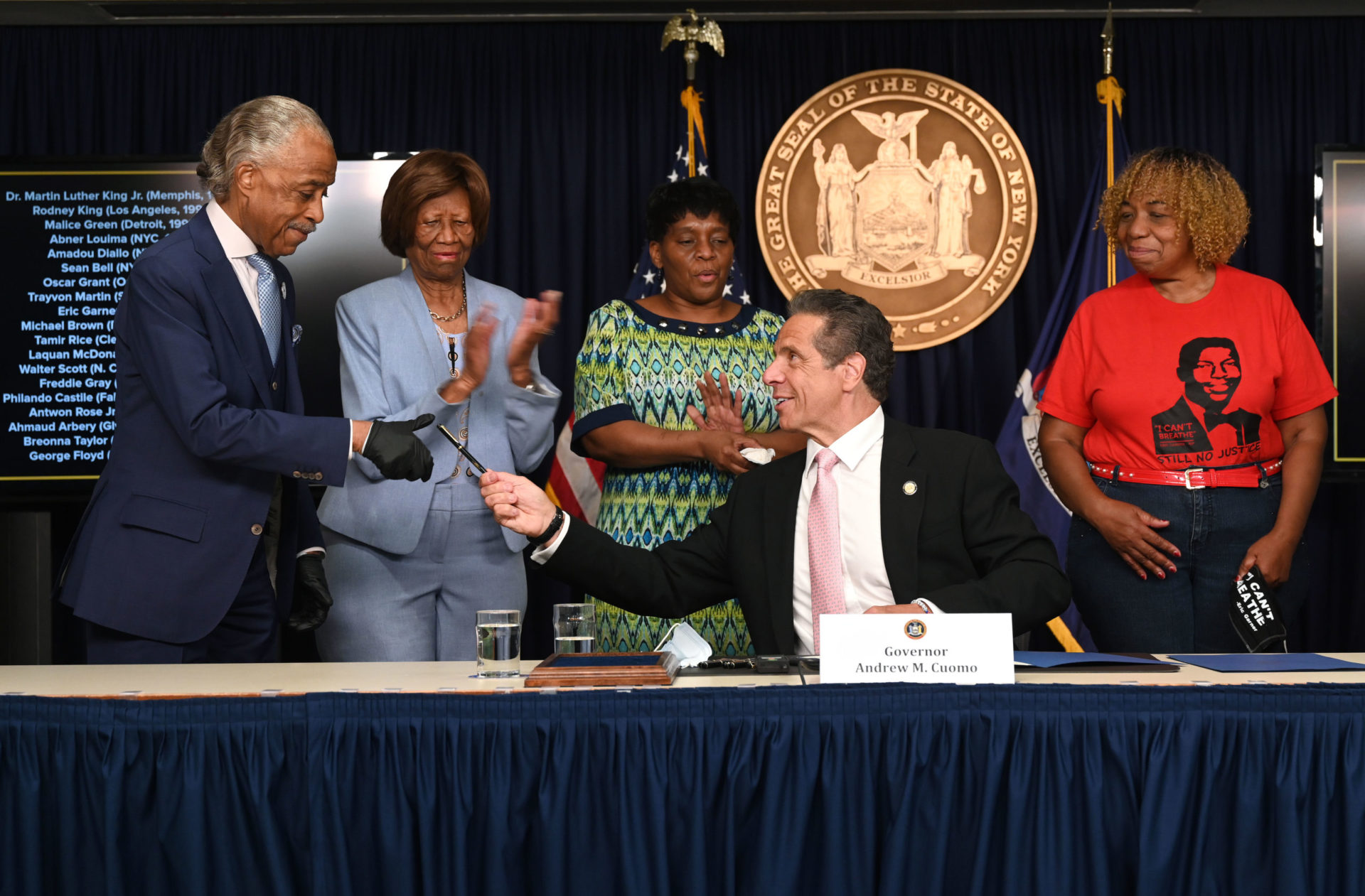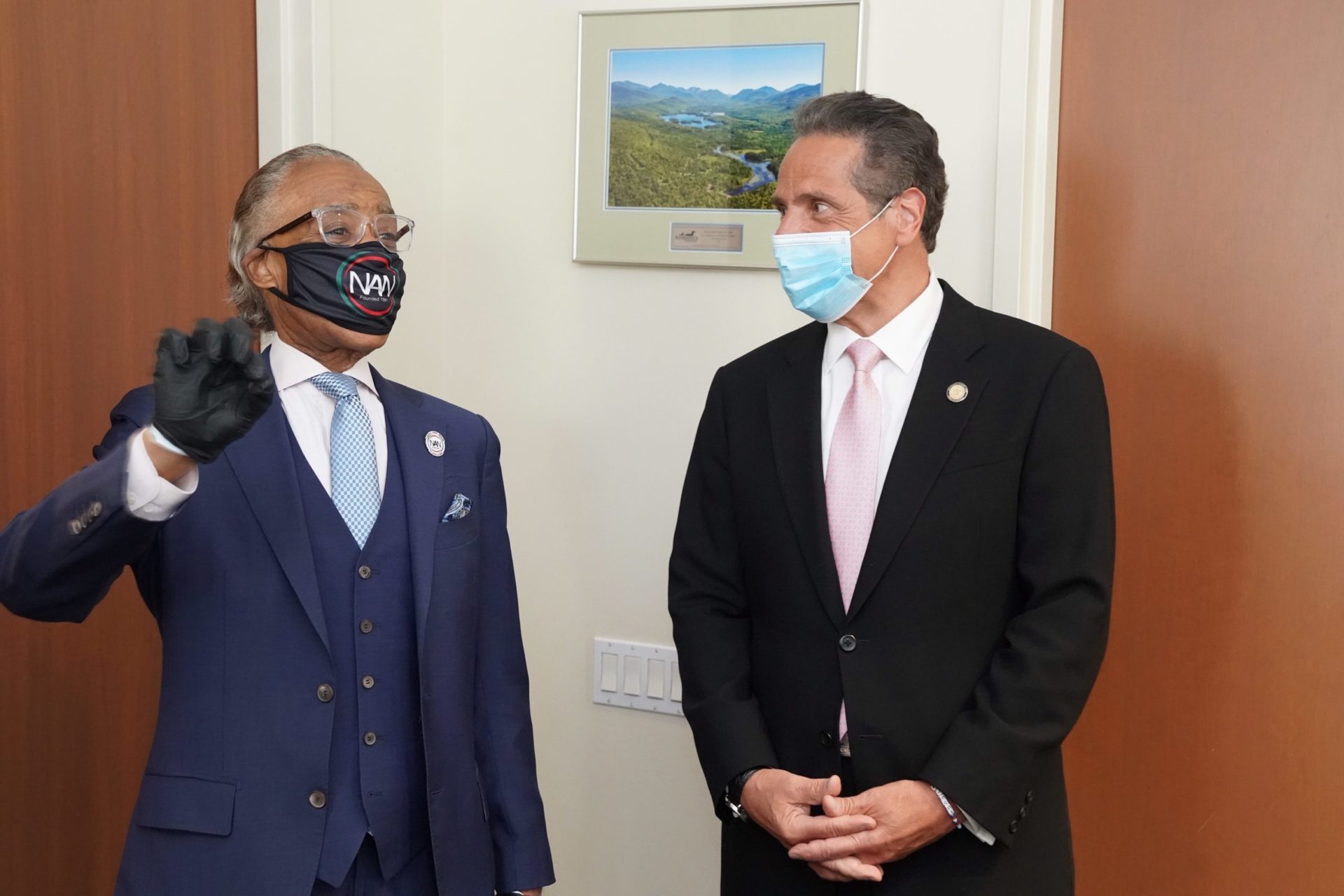Cuomo Signs Historic Criminal Justice, Police Reform Bills


With Governor Andrew Cuomo’s signature on Friday, criminal justice and police reform bills, the first of its kind in the nation, became law on Friday.
Just one week ago, the governor floated the “Say Their Name” reform agenda to end what he called an ongoing pattern of police brutality against minority communities, the most recent of which was the death of George Floyd in Minneapolis, which sparked protests nationwide, including in this state. “The New York State Legislature has quickly passed the most aggressive reforms in the nation this week,” Cuomo said before he put his signature on them.
Now, there will be transparency with regards to disciplinary records of police officers accused or being investigated — a change to the decades old Section 50-a of the New York State Civil Rights Law that has allowed the police to keep personnel records private — chokeholds by police are banned, false 911 calls based on race will be considered a hate crime. Lastly, the attorney general has been made the independent prosecutor for all matters relating to the deaths of unarmed civilians by law enforcement officers, something Cuomo had implemented through an executive order five years ago, but now it is codified by law.
“We are a state of action,” Cuomo said. He quoted the late Rep. Shirley Chisholm who said, “You don’t make progress by standing on the sidelines . . . You make progress by implementing ideas.”
Cuomo said police reform was long overdue, even before the civil unrest that followed Floyd’s death 19 days ago. “This is not just about Mr. Floyd’s murder. It’s about being here before — many, many times before. It is about a long list that has been all across this country that always makes the same point— injustice against minorities in America by the criminal justice system. And today is about enough is enough . . . How many times do you have to see the same case before you do something? This was Eric Garner. This was Abner Louima. This was Amadou Diallo.”
“The truth is it goes back to Dr. Martin Luther King, 1968. It is systemic discrimination injustice in this nation. That’s what it is. That is what today is about,” he added.
Cuomo hopes sweeping criminal justice reform is soon addressed on the federal level, as well.
Even with the aggressive reform bills in the state, Cuomo said there is no quick fix. He said that each police department across the state needs to consider the situation with “a new lens of reform and reinvention because this has been 40, 50 years in the making.” He referred to the increase in police, giving police military equipment, and the population explosion in the prison system as factors.

“The way we really solve this is say to every police agency in the state — I believe in the nation — sit down at the table with the local community, address these issues, get to the root of these issues, get a plan, pass that plan by the local government, and if you don’t you’re not going to get any additional state funds. Period. We’re not going to fund police agencies in this state that do not look at what has been happening, come to terms with it, and reform themselves. We’re not going to be as a state government subsiding improper police tactics. We’re not doing it.”
Cuomo said he will issue an executive order Friday that mandates that local police departments — of which there are about 500, including nine on the East End — to develop a plan that reinvents and modernizes police strategies and programs in their community. Under New York State Police Reform and Reinvention Collaborative, police departments will have to formulate a plan addressing issues of the use of force by police, crowd management, community policing, bias awareness training, deescalation training and practices, restorative justice practices, community-based outreach, a transparent citizen complaint disposition procedure, appropriate — and not appropriate — equipment, and any other issues raised within that community.
The plan must be enacted into local law by April 1, 2021 — or there will be no further state funding, Cuomo said.
“What we know is certainly true: There is no trust between the community and the police. That is what the protests have said. If there is no trust the relationship doesn’t work. If there is no trust the police can’t effectively police,” Cuomo said. “Let’s figure it out community by community across the state.”
The mothers of two men killed by New York City police, in cases that raised questions of excessive force, joined Cuomo at the dais for the historic signing Friday. Gwen Carr’s son Eric Garner died after an officer put him in a chokehold while arresting him in Staten Island in 2014 and Valerie Bell’s son Sean Bell was shot by police in Queens the morning before his wedding back in 2006.
The governor applauded the women for their advocacy over the years. He also thanked Senate Majority Leader Andrea Stewart-Cousins and Assembly Speaker Carl Heastie as well as the bill sponsors. Hazel Dukes, the president of NAACP New York State Conference, and the Rev. Al Sharpton were also on hand.
Earlier this week, Assemblyman Fred Thiele said in a statement that as a member of the Assembly Majority, he worked to help craft legislation that was “the first step to address this cancer afflicting our society.”
The assemblyman said that transparency and accountability were at the heart of the legislative package. “As Justice Brandeis said more than a century ago, ‘Sunlight is said to be the best of disinfectants’,” he said. “At the core of the issue is racism, which has challenged the promise of America since its inception. It is uncomfortable to discuss but cannot be avoided. This is not a police problem. This is an American problem. The police, like all of our institutions, are not separate from us, but they are a reflection of us. We must excise racism from our midst so that trust is restored. The great contributions of so many in law enforcement to our community should not be obscured by the corrosive effects of bigotry.”
taylor@indyeastend.com



